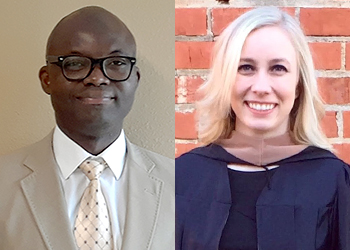The accounting concentration in the Dillard MBA is ideal for individuals with an undergraduate degree in accounting from an AACSB accredited institution who wish to become a certified public accountant (CPA).
It is possible for highly motivated individuals without an accounting degree from an AACSB-accredited institution to use the accounting concentration to complete the educational requirements to sit for the CPA. Doing so would require the individual to first complete about 27 hours of upper-level accounting coursework at the undergraduate level before entering the MBA accounting concentration coursework.
ALL accounting concentration courses (and the preparatory undergraduate courses too) are currently offered only in the face-to-face format at the Wichita Falls campus. Because the Texas State Board of Public Accountancy has detailed requirements to take the CPA exam, students must complete this departmental application and meet with an accounting professor before entering the accounting concentration.
Benefits of an MBA with an Accounting Concentration
The AICPA has long been a proponent of the value of CPA candidates obtaining an MBA or other graduate degree. The "market" recognizes this, as well, as many job postings for experienced Accountants request "MBA/CPA." The MBA offers the breadth of business knowledge along with additional accounting expertise needed to succeed as a CPA. The MBA’s breadth allows CPAs to excel in a large variety of management scenarios and business challenges.
The coursework is designed to assist students in preparing for the CPA examination. Graduates work in public accounting firms as well as in the accounting and finance departments of corporations, government agencies, and nonprofit organizations.
ACCT 5013 Graduate Petroleum Accounting 3 (3-0)
Basic financial accounting and reporting requirements for oil-and gas-producing companies, fiscal processes of a petroleum company, and compliance requirements of professional and regulatory organizations. Students with credit for an undergraduate Petroleum Accounting course may not enroll in this course. This course is counted toward the TSBPA's requirements for the 30 Accounting credit hours.
ACCT 5223 Accounting Research and Communication 3 (3-0)
Introduces graduate students to professional accounting research. The course includes a study of the authoritative sources useful for accounting research. Students research, analyze, develop, and present proposed solutions to accounting and related business cases found in practice using such modern information technology resources and databases, as the Financial Accounting Research System (FARS). The results of the research will be presented both written and orally. This course partially fulfills the Texas State Board of Public Accountancy's (TSBPA) requirements for accounting research and communication, in combination with the undergraduate Auditing course.
ACCT 6663 Federal Tax Research 3 (3-0)
A detailed study of U.S. federal tax research concepts, practices, and applications. Emphasis is placed on the tax research environment, primary sources of federal tax law, tax research tools, and implementing the research tools. Additional topics include professional ethics, tax planning, and tax practice and administration. Students will engage in supervised tax research projects using modern tax research databases, such as required on Regulation (REG). This course is counted toward the TSBPA's requirements for the 30 Accounting credit hours.
ACCT 5893 Graduate Internship in Accounting 3 (3-0)
Field experience in selected areas of business administration with local or regional organizations. May involve a specific project or theoretical integration with the "real world." A written report and employer evaluation are required . Must be a new "experience" and requires the consent of the Internship Coordinator and the Graduate Coordinator, BEFORE beginning internship. In Texas only a maximum of 3 academic credit hours from Internships count for the CPA Exam requirements.
Broadly speaking, the TSBPA requires that an applicant has completed 150 hours of college course work. Within those 150 hours, 30 semester hours must be upper-level accounting courses. The TSBPA also requires an approved ethics course. The TSBPA website details the requirements more specifically, to include which accounting courses and ethics courses are acceptable.
Accounting Graduate Students are eligible for all scholarships offered by Dillard College of Business Administration
Additionally, Accounting Graduate Students are also eligible for scholarships offered by TSBPA, the AICPA, and many other professional organizations.

A current Midwestern State University graduate student and a recent graduate are recipients of scholarships from the American Institute of Certified Public Accountants that will assist them as they take the final steps in their accounting certification.
Graduate student Gerard Jonkam received an AICPA COVID-19 Student Hardship Grant for $2,000. Gerard plans to graduate in December 2020 with an MBA with a concentration in accounting.
Rachel Smith, a 2018 MBA graduate, was one of 50 CPA candidates nationwide who received a $1,500 scholarship from the AICPA Foundation. She also earned her undergraduate degree from MSU Texas in 2017. She has been working in the field and has passed three of the four required CPA exams. She hopes to receive her certification by the end of the year.
Smith said earning a CPA license is a challenging, involved process. “Receiving this AICPA scholarship enabled me to focus wholly on studying for the exams and find great success by doing so. I am sincerely thankful for this scholarship, as well as all the support I received from MSU faculty, staff, and donors as I’ve pursued this achievement,” she said.
Jonkam said the chance to apply for the grant could have passed him by, but Susan Anders, the Louis J. and Ramona Rodriguez Distinguished Professor of Accounting, informed students during the summer about the grant. “I am truly grateful for her giving us the heads up,” he said. “This grant will go a long way to assist me financially.” Jonkam said receiving his scholarship reinforced his faith that hard work would be rewarded.